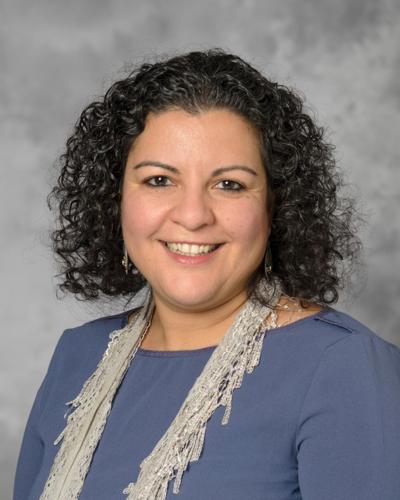This story was created by #ThisIsTucson and underwritten by SonderMind, helping you find the health provider you need. Thank you for supporting the local organizations that support us!
So many aspects of our lives have been completely disrupted by the pandemic. And if your days and weeks are filled with more lows and more stress, you're definitely not alone.
"I would say that more people seem to be struggling because of obvious reasons of isolation, financial struggles and being stuck in the same house with people they may already have struggled to get along with or being parents of kids who are struggling with the transition to the COVID lifestyle," says Dr. Noshene Ranjbar, an assistant professor in the Department of Psychiatry at the University of Arizona College of Medicine and faculty at the Center for Mind-Body Medicine. "... It's not true that everyone's struggling more but I would say, certainly for a lot of the adults there has been more stress."

Dr. Noshene Ranjbar
But people may be hesitant to seek professional help or therapy for many different reasons, including the stigma that surrounds mental health and a general lack of knowledge about what resources and different therapies are available. Many people might also be turning to other ways of coping with their feelings.
"I think those differences have to do with cultural differences, with ways people try to find relief — some people are obviously going more toward substances and ways to self-soothe with more electronics or more screentime, more food, more alcohol or whatever to try to cope," Ranjbar says. "Hopefully some people are exercising more and taking better care of themselves."
When it's time to seek professional help
So, how can you tell if what you're doing isn't enough and it's time to seek help from a mental health professional?
"Basically every human being has resiliency or protective factors, and vulnerabilities, it's just part of who we are," Ranjbar says.
Vulnerabilites can include things like a genetic disposition to mental health disorders or substance abuse, poor nutrition, poor sleeping habits and medical conditions.
Protective factors include how well we can self-regulate, having good nutrition and sleep, healthy relationships and having our basic needs met, Ranjbar says.
"So when those are all in place, then we can take more stress without falling apart," she says. "And when those are lacking, so now there's a divorce, and there is a pandemic and finances are not good, then you can see the stress factors are going up, the vulnerability is going up and the protective factors aren't rising to meet the amount of stress. Then almost anyone can tip over into mental health issues."
She says it's important to be aware of what's contributing to your vulnerabilities and how those could be overpowering your protective factors in negative ways like too little or too much sleep, unhealthy eating habits, easily losing your temper with others, and ways your work, social life or relationships are being adversely affected.
"When the things that we're usually doing to make ends meet and to function and hold it together as healthy adults — when those things are getting impacted, then you can't really just rely on your family to be the only source of support or it's not enough to just go to your church person or just go to a friend because none of those systems have everything to provide," she says.
Having suicidal thoughts or thoughts of self harm or harming others are obvious signs that you should seek immediate care. Pima Helpline has a list of hotlines you can call to connect with some immediately if you are in crisis.
Things to consider when choosing a therapist
When you've decided to seek professional help there are a few things to consider when looking for a therapist.
"Part of what therapy is there for is to create a safe space to explore, to get to know oneself better, to become more aware, to become more willing to make changes or consider different ways of looking at a situation or behaving in a situation that can be more health promoting," Ranjbar says. "So you can only really successfully do those things if you really trust and feel good about the person you're working with."
Some things to consider are whether you are more comfortable speaking with a man or woman or with someone who either shares or has experience working with someone with the same culture or religious beliefs as yours, Ranjbar says.
Learning what ages a provider is trained to work with and whether their office is conveniently located for you are also important, although many therapists are now conducting visits by phone or virtually.
You might even have different providers for different reasons.
"A lot of times people end up having different professionals, one for therapy, another for prescribing, another one maybe for groups versus individual or family work, there's also couples therapists if someone is having struggles within their relationship," Ranjbar says.
Whether a provider accepts your insurance or not is also a big consideration. If you're uninsured, the UA offers a free clinic called the MIND Clinic that is run by medical students supervised by board-certified psychiatrists.
Usually a provider will offer a free consultation to help determine whether they are the right fit to provide the care you need and give you the chance to feel them out too.
It's important not to be discouraged if finding the right therapist takes a few tries, Ranjbar says.
"It's a little bit of exploration because a lot of times the first therapist somebody goes through ends up not being the one that meets their needs," Ranjbar says. "So we'll have to be a little bit open about that fact that it might take one or two tries to find the right person and the right modality."
Therapy isn’t always easy. Finding it ought to be.

Make your mental health a priority
SonderMind helps you find a licensed therapist who accepts your insurance and is available to see you either in-person or online.
Learn more about SonderMind and match with a therapist in Tucson.







